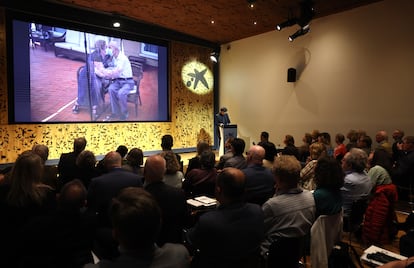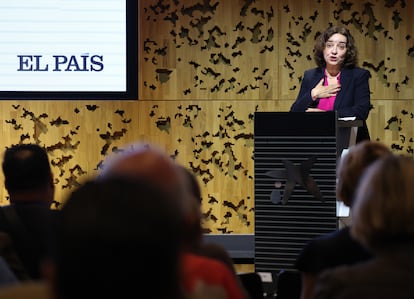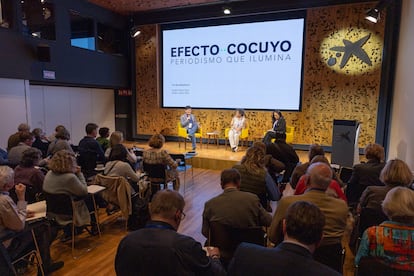Fifty international readers’ advocates meet in Madrid to discuss threats to journalism
On the 40th anniversary of the establishment of this position at EL PAÍS, this newspaper organized the annual meeting of the Organization of News Ombuds and Standards Editors

With journalism in the crosshairs of all kinds of powers pressing to silence the truth and amid a global advance of authoritarianism, more than 50 international ombudsmen are meeting in Madrid this week to discuss an increasingly threatened profession. On the 40th anniversary of the establishment of the ombudsman position at EL PAÍS, this newspaper is organizing the annual meeting of the Organization of News Ombuds and Standards Editors (ONO). And more than 50 of its 80 members from five continents — both ombuds and other executives responsible for maintaining ethical practices within their newsrooms (standards editors) — began Wednesday to share their concerns in the face of these turbulent times.
During the presentation of the conference at the CaixaForum center in Madrid, EL PAÍS editor-in-chief Pepa Bueno highlighted the reason for the success of the event. “We are living in a time when we need to talk, meet, and exchange experiences about the practice of journalism and internal checks and balances within news organizations.” Soledad Alcaide, the current readers’ representative at EL PAÍS, had previously recalled that Bueno mentioned the need for innovation when she proposed that she play this fundamental role in the newspaper’s self-regulatory structures, which include the Style Guide, the Newsroom Statute and the Comité de Redacción, the representative body of the newsroom staff. “The only instruction she gave me was: invent it,” Alcaide said.

The editor-in-chief of EL PAÍS said about Alcaide’s appointment as the news ombuds that “the time had come to reach out to digital readers and propose an ongoing conversation, to step down from the civil pulpit and establish a conversation with a public with a commitment to respect.” And she noted — despite all the difficulties facing journalism — certain elements of hope at a crucial moment for media credibility. “During the recent blackout in Spain, citizens who had their own electricity connected to our newspaper as if it were an election night. I hope there won’t have to be a pandemic or a blackout for journalists to regain credibility. I hope the search for reliable information becomes a daily occurrence. It’s not enough to survive; we need to be relevant to democracies.”
For ONO president Margo Smit, who serves as the news ombuds for Dutch public media, “being a journalist has never been easy, but being a readers’ representative or a guarantor of a media outlet’s quality standards is even less easy.” She highlighted, among the current challenges, “the increasingly limited access to reliable sources of information and the decline of journalism in times of fake news.” But Smit also wanted to inspire a message of optimism for her peers by delivering a poem written by a colleague in collaboration with ChatGPT’s artificial intelligence, entitled “Guardians of the Fourth Estate,” which outlines some key aspects of the work journalists do: “They do not seek praise, they do not seek fame, but let justice speak in our name.”
In addition to the topics that will be included in its annual internal meeting, the presentations — which are closed to the public and also feature professionals from outside the ONO — will address issues ranging from responsible image publishing to the investigation of sexual abuse in the era of social media; legal threats to independent journalism; difficulties practicing journalism in regions such as Latin America; the rise of influencers among information-seeking audiences; the strengthening of standards in times of crisis; and the need to promote media literacy programs among citizens.
Emilio Morenatti, one of Spain’s most internationally renowned photojournalists, outlined the principles that have guided his work throughout his career during a presentation Wednesday. While images he captured during various armed conflicts and events such as the impact of the pandemic in 2020 were projected, Morenatti reminded the readers’ representatives and journalistic standards advocates present in the room of the importance of their work as editors. “Defending the images, contextualizing them, is in your hands.” Morenatti, who is affiliated with the Associated Press, praised his organization’s standards, which guarantee the reliability of its publications, but also warned of the risks posed by the use of generative artificial intelligence to create images about armed conflicts. “It’s going to happen soon if we don’t react as journalists. That line can’t be crossed; you’ll ruin your reputation as a media outlet. When I get emotional taking a photo, it provokes the same feeling in the audience. Generative AI bypasses all of that. That’s why journalists who communicate on the ground are so important.”
The ONO members’ debate with Morenatti was followed by another with EL PAÍS journalists Ana Marcos and Elena Reina, who shared details of the investigation process, along with their colleague Gregorio Belinchón, into various cases published in the newspaper about sexual abuse in the Spanish cultural industry. Soledad Alcaide recalled that these stories “have always come from women who wanted to give their testimony, and they have not been testimonies of one woman against a man, but of several women pointing the finger at one man whom the industry has been covering up.” Reina and Marcos emphasized that “every line of these women’s stories had to be verified because they would be questioned, much more than any other issue, due to a situation of structural sexism.”

Venezuelan journalist Luz Mely Reyes, founder of the outlet Efecto Cocuyo, and her Mexican colleague Adela Navarro Bello, editor of the investigative weekly Zeta, published on the Tijuana-San Diego border — moderated by Gerardo Albarrán de Alba, ombuds for several Mexican media outlets — debated the threat to journalism in Latin America. The moderator recalled the low ranking of the speakers’ countries of origin on the Reporters Without Borders list of global press freedoms, and how Mexico “is the most dangerous country for journalism in the entire region, with more than 170 journalists murdered since 2000.” Several of them were members of the weekly newspaper directed by Navarro Bello, who highlighted the decision they made in 2006 to withdraw their names from the bylines of stories about drug trafficking and organized crime in Mexico to protect the safety of their reporters.
“Journalists who investigate drug trafficking and government corruption are caught in the crossfire,” said Navarro Bello. “The bullets of drug traffickers and the attempted censorship of governments at all levels.” Mely Reyes, for her part, challenged those present: “You have readers and media outlets to defend because you have democracy. We no longer have any of that in Venezuela.”
ONO members attended a final presentation in the afternoon before departing for a private visit to the Prado Museum, followed by another to the Royal Collections Gallery. Eduardo Suárez, editorial chief of the Reuters Institute at Oxford University, and Gia Thom, development director of Impress — the independent media regulator in the United Kingdom — discussed the rise in audiences, especially younger ones, turning to social media as a means of consuming digital news. This is where influencers who develop political commentaries, infotainment, new young creators, and journalists who are switching to this business model play a key role. “After years of trying to promote equality in our industry, this is instead a very masculinized world,” noted Suárez after recalling the role they played in the recent U.S. presidential elections. Thom concluded: “On many occasions, content creators have figured out how to beat the system.”
Sign up for our weekly newsletter to get more English-language news coverage from EL PAÍS USA Edition
Tu suscripción se está usando en otro dispositivo
¿Quieres añadir otro usuario a tu suscripción?
Si continúas leyendo en este dispositivo, no se podrá leer en el otro.
FlechaTu suscripción se está usando en otro dispositivo y solo puedes acceder a EL PAÍS desde un dispositivo a la vez.
Si quieres compartir tu cuenta, cambia tu suscripción a la modalidad Premium, así podrás añadir otro usuario. Cada uno accederá con su propia cuenta de email, lo que os permitirá personalizar vuestra experiencia en EL PAÍS.
¿Tienes una suscripción de empresa? Accede aquí para contratar más cuentas.
En el caso de no saber quién está usando tu cuenta, te recomendamos cambiar tu contraseña aquí.
Si decides continuar compartiendo tu cuenta, este mensaje se mostrará en tu dispositivo y en el de la otra persona que está usando tu cuenta de forma indefinida, afectando a tu experiencia de lectura. Puedes consultar aquí los términos y condiciones de la suscripción digital.









































